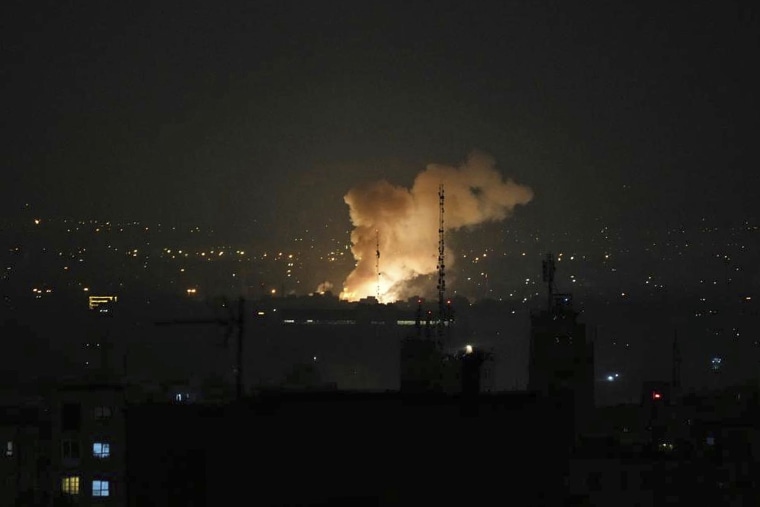Iran's nuclear activities have become one of the main topics on the international agenda in recent days. Diplomatic contacts between the US and Iran on the nuclear program have become intensive. In parallel with this process, experts from the International Atomic Energy Agency (IAEA) visited Iran and prepared a report on their monitoring of nuclear facilities.
However, the report prepared by the IAEA was evaluated by Iran as a biased and politically motivated document. The official Tehran rejected the report, stating that the country's nuclear program serves purely peaceful and scientific research purposes. At the same time, Iranian officials have openly stated that uranium enrichment will continue despite international pressure.
Iran's nuclear ambitions

Iran's enrichment of uranium above 60 percent is technically considered a significant threshold for transition to a military level, and this is a serious concern in the West, especially in circles trying to prevent the spread of nuclear weapons, including the United States, Great Britain, and France. The issue is not limited to the future of nuclear agreements - this process also tests the stability of the regional security architecture.
The situation has also caused acute concern among states in the region, including Israel, which considers Iran's nuclear ambitions a direct threat to their national security. And the development of events in this direction is paralyzing diplomatic efforts.
As a result, Israel launched a large-scale air strike against Iran last night.
Strikes on Iranian nuclear facilities

The Israeli Air Force has carried out limited but strategically targeted strikes on Iran's nuclear infrastructure. Official Tel Aviv has stated that the main goal of the operation is to weaken Iran's potential to acquire nuclear weapons.
During the attack, Israeli forces mainly targeted nuclear research facilities near Natanz, Fordow, and Isfahan. According to reports, the attack plan was based on long-term intelligence information, and special attention was paid to avoiding damage to civilian infrastructure. The Israeli Defense Ministry said that the strikes were only aimed at facilities directly related to the military and nuclear program.
The four strategic objectives behind Israel's attack

Former Israeli Knesset member and political analyst Elina Bordach-Yalov told APA that the Israeli airstrike aims to slow down Iran's nuclear and missile programs, prevent a possible attack, weaken air defenses, and neutralize the IRGC leadership.
According to her, Israel’s strike package pursued four primary objectives:"Firstly, to delay Iran’s nuclear and long-range missile programs; secondly, to preempt an attack that Tehran was reportedly hours away from launching; third, to suppress Iran’s western air defense belt and enable follow-on strike waves; and fourth, to decapitate the senior IRGC command to disrupt operational control."

Iranian political expert Ghaem Maghami told APA that Israel's airstrikes on Tehran, Tabriz, and other Iranian cities at night are an act that seriously threatens stability in the region and contradicts the principles of international law.
According to the expert, these attacks, targeting not only military facilities, but also civilian infrastructure and residential buildings, show that Israel is deliberately intending to create panic and chaos among the civilian population: "This step by Israel cannot be justified in any way, both from a humanitarian and strategic perspective. This is a clear act of aggression. Israel wants to weaken Iran's spirit of resistance and maintain its dominance in the region with such operations, but this approach is completely wrong. History shows that the Iranian people are becoming more united in the face of external pressure and military threats. Instead of gaining a strategic advantage for itself, this step by Israel may lead to greater conflicts. The international community should not remain indifferent to this incident and should demonstrate a principled position against acts of aggression targeting the civilian population. Otherwise, such attacks may become a precedent and lead to a larger-scale war."
Israel targets high-ranking Iranian military personnel and nuclear scientists

Israel's latest airstrikes against Iran targeted not only nuclear infrastructure, but also the program's main intellectual and military pillars.
The operation, which was prepared as a result of long-term observations and technical analyses by Israeli intelligence, had precise timing and coordinates of the strikes. The operation targeted scientific and military brain centers that play a key role in Iran's nuclear weapons development.
Israel's latest airstrikes killed senior Iranian military personnel and nuclear scientists. Among them were Chief of Staff of the Armed Forces Mohammad Bagheri, Commander-in-Chief of the Islamic Revolutionary Guard Corps (IRGC), Hossein Salami, and Gholam Ali Rashid, a senior general in the Supreme Headquarters. The strikes also killed the former head of the Atomic Energy Organization of Iran and nuclear scientist Faridun Abbasi-Davani, and professor of physics and head of Tehran Azad University, Mohammad Mehdi Tehranchi. Local media reported that several other nuclear scientists were also killed or injured.
Initial results of the attack
The Israeli political scientist believes that from a tactical and political perspective, it is possible to say that the Israeli attack has yielded certain results: "Have objectives been achieved? Tactically and politically, yes — nuclear facilities, missile sites, and senior commanders were successfully targeted. The Israeli Air Force has described it as a successful opening blow. Strategically, however, the situation remains unresolved. Iran retains the capacity to rebuild parts of its program and has already launched more than 100 UAVs toward Israel. Air defense batteries are currently intercepting them and this indicates that the situation will become even more tense."
Commenting on the idea that Iran's defense system is weak, Iranian expert Ghaem Maghami noted that a high-ranking IRGC commander and nuclear experts were killed, and civilian buildings in Tehran, Tabriz and other cities were seriously damaged:"As a result of the Israeli attack, a large number of women and children were killed, which shows that the attack had not only military but also humanitarian consequences. The head of the IRGC was targeted and martyred. His death is considered a serious loss for the Iranian military leadership. In addition, the homes of several highly qualified specialists working in connection with Iran's nuclear program were also hit by rockets, as a result of which they also lost their lives. The targets of the strikes were not limited to strategic facilities, but also caused serious damage to multi-storey civilian residential buildings located in Tehran, Tabriz, and other cities. This once again demonstrates that the conflict has taken on a direct threat to the civilian population and its impact on regional stability," he said.
How will Iran react?

Iran's response is being closely watched by the international community. It is likely that Tehran will respond not directly, but indirectly - through proxy groups, Shiite militias in Iraq, and Hezbollah in Lebanon. At the same time, Iran is expected to seek a response through cyberattacks and diplomatic pressure. Tehran could raise the issue in the UN Security Council, emphasizing that Israel is violating international law. However, the likelihood of open war is currently assessed as low.
Elina Bordach-Yalov noted that Israel has entered a state of emergency preparedness in response to a possible multi-pronged Iranian response: "What comes next? Likely, a multi-front Iranian retaliation — potentially involving hundreds of ballistic missiles and drones launched from Iran and its proxies in Yemen, Lebanon, and Iraq. Israel remains on high alert. The Home Front Command has declared a state of emergency, canceled school classes, suspended air traffic at Ben Gurion Airport, and mobilized thousands of reservists. Intense international diplomacy is also underway. The United States has reinforced its forces in the Gulf, and several countries are urging both sides toward a ceasefire."
She noted that the risk of a full-scale war is increasing: "There is a real risk of full-scale war. The IDF is preparing for days, possibly weeks, of direct confrontation with Iran and its proxies. Whether the situation crosses the point of no return depends largely on Tehran’s next move. A large-scale attack on Israeli or U.S. targets could escalate the conflict into a region-wide war, potentially drawing in Hezbollah and opening additional fronts across the Gulf."

Ghaem Maghami noted that after the Israeli airstrikes, Iran's Supreme Leader, President, and Defense Minister issued harsh statements, stating that foreign forces were behind the attacks, and that Israel's move would not go unanswered, and that all military and strategic facilities in the country had been put on high alert: "Following these events, Iran’s Supreme Leader Ayatollah Sayyid Ali Khamenei, President Massoud Pezeshkian and the Defense Minister issued successive statements, stressing that a decisive and regrettable response would be given to these attacks carried out by Israel. According to Tehran’s position, Israel is trying to create new hotbeds of conflict in the region with such provocations, which is a serious threat to regional peace and stability. The Iranian leadership has openly stated that the crimes and violations of international law committed by Israel will not go unanswered, and Tehran is ready to protect its territorial integrity and national security by all military and diplomatic means. At the same time, it was noted that this Israeli operation was planned and carried out with the support of some foreign powers - especially some circles in the West and its allies in the African region. The Israel Defense Forces, in turn, issued a statement stating that the operations could last for several days. The situation inside Iran has become tense, and all military bases, nuclear facilities, ports and strategic infrastructure across the country have been put on high alert, air defense systems have been activated, and reserve forces have been mobilized. According to reports, at approximately 6 a.m., refueling planes taking off from US military bases in Saudi Arabia provided Washington's indirect and technical support for Israel's operations against Iran. This incident once again brought the US presence in the region and the role it plays in the logistical support of Israeli airstrikes to the agenda. In addition, it is alleged that radar bases under NATO command in the countries of the region transmit intelligence information to Israel. According to reports, these bases are cited as one of the main sources used by Israel to plan and coordinate air strikes. Experts say that there is a direct exchange of information between these radar systems and similar facilities in Israel, which allows Israel to conduct operations in the region more accurately and effectively. The involvement of both NATO and the United States in this process raises serious questions about the level of participation of international powers in the region."
Iran suspends nuclear talks, diplomatic options narrow
Following Israeli attacks, Iran announced it had suspended nuclear talks. Tehran described Israel's move as an "aggressive attack." However, while the attacks have hit Iran's nuclear program, they are unlikely to completely halt it. Iran could continue its activities through alternative means. It seems likely that the course of events will be accompanied by diplomatic pressure, new sanctions, and a possible military escalation.

